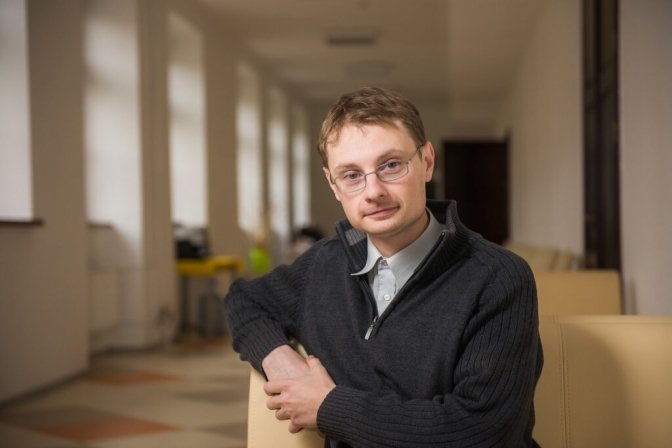
[For urgent updates please follow Ukrainian Freedom News in Telegram]
The perception of war has changed after a month of hostilities, and now, after the stage of heroism passed, we have to deal with war fatigue. To explore these issues and find solutions, Lviv Now talked to Oleksandr Avramchuk, Candidate of Psychological Sciences, Associate Professor of the Department of Clinical Psychology at Ukrainian Catholic University.
The month of euphoria from the heroic resistance has already passed. At what stage of psychological perception are we now?
From a purely psychological point of view, I see this as a change that is accompanied by our attempt to adapt to new life circumstances. We are trying to rethink ourselves and our environment in the context of these new circumstances and work out a way to respond to the losses we have already suffered.
If we consider this as a process of adaptation, it is the changes that occur primarily at the level of the nervous system. When we find ourselves in an acute situation, our body is mobilized as much as possible to ensure the main goal – survival. The body neglects certain aspects of social relationships, including humanity. At certain times in this acute period, we do something selfish. And this is completely normal, natural evolutionary selfishness. Nature has the idea that if we do not survive, we will not help anyone.
Read also: Four psychological phases of war. Why we are going to the disappointment stage?
The fact that we have gained new experience of mobilization, coped with it and see that others are coping with it too, is an element of significant reward for us. When I see success not only for myself but for others, it also supports each of us. It gives hope that each of us is moving in the right direction, that we are all moving in the right direction.
When our psyche encounters a danger that it may perceive as inevitable or that it cannot cope with, it tries to deny it first. That is, to devalue, to say that it does not exist, to distance itself as much as possible. We know the typical manifestations of fading, when a person faints or his/her mental activity is so encapsulated that person loses the ability to communicate with people, is in a state of confusion, prostration.
At the level of individual or collective psychology, this can be manifested in the desire to ensure your own survival, sometimes without thinking about the consequences or those around us. And sometimes to devalue the situation of danger. And even though person hears bullets whistling overhead, he/she can say, «Yeah, it won’t hit me.»
This can reduce the criticality of our thinking, perception of the situation and increase the desire to get a quick reward: the pleasure of relieving stress at any cost. This is also normal. This is not a manifestation of pathology or any deviation. This euphoria is useful because it supports mobilization, unity and a sense of reward, but often it is also an inability to give the right estimation of the life situation.
When reality catches us up, we should expect several options. The first is that our response may deteriorate. While we are in euphoria and maximally mobilized, the nervous system spends a lot of energy. But we can’t, unfortunately, be happy all this time. At certain point our body signals that we are tired.
This fatigue can come suddenly, and a person will see one day that he / she is unable to get out of bed. It also can be gradually, then we will try our best to find things that will feed this «heat». For example, scroll through social networks to find a «dead Muscovite» and get a dose of endorphins. But all the other information we receive will be perceived as a failure to find something that can give pleasure. And if, after scrolling through the news, we do not find a single «murdered Muscovite», then «we got off on the wrong foot.»
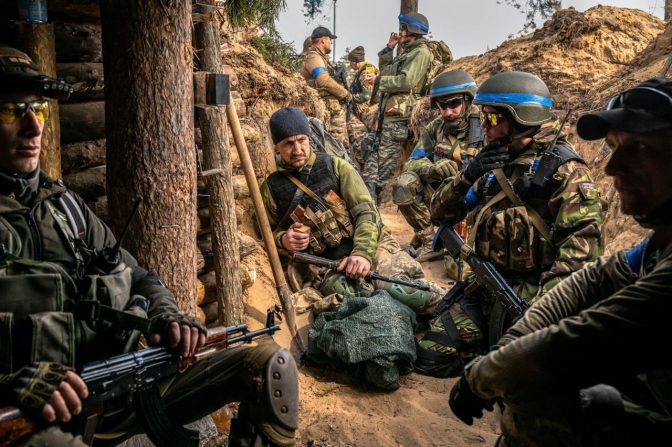
We may have a thought that will be so all the time. I do not want to be a pessimist, but when we finally have to stop, we will not be ready to accept that we are not running anywhere. Many experts are convinced that the protracted period of the war may be the most difficult not because of the gradual depletion, but because of the unusualness of this for us. Russia wanted to make a blitzkrieg, was preparing for it morally and was disappointed. Now, we see the consequences. We may have similar because of the expectation that the war did not end quickly despite a period of very successful military operations and negotiations.
At this time, we may feel tired, more vulnerable, looking for a quick reward and a quick way to satisfy ourselves in something. Therefore, the risk of conflicts in social situations may increase, especially in places where it is safer, such as Galicia. These are conflicts of views, attitudes to the political situation. We are already noticing the division between those who are for and against the referendum. Now the internal civic aspect will come to the fore in the relationship. It can in its own way deplete, disturb, depress.
The second aspect is to some extent a continuation of the previous one, but can also be independent. It is associated with the search for quick relief in alcohol or drugs. In large cities, there is a ban on alcohol, on drugs – a permanent ban. However, in long periods, people will start looking for similar ways to relax. I think part of the population of Ukraine has already started google about how to assemble a moonshine machine. And this is expected. Working with volunteers, I have heard many people admit that they really need to drink. This reveals that we do not have enough acceptable strategies to deal with this in any other way.
The third option is a sharp return or immersion in the routine of life around the clock: study, work, volunteering. We saw the peak of aggravation in the beginning, when it was needed. Then it began to decline. And I think that when we go to the moment of waiting to maintain a sense of usefulness and potency, we will look for where we can realize ourselves to the fullest. This may seem like a perfectionist desire. If it becomes the only one, it will lead to exhaustion.
During these periods that we need to review aspects of adaptation and the internal resource that can support us. I think that this period can last in different ways. Largely it depends on events, internal and external, including political, until a new conflict arises, around which we will get the impetus for action. This will happen from time to time, and people will not always notice the changes that will take place. What’s better, because it will support our ability to stay «on earth» and not fall into euphoria.
How to deal with the frustration and fatigue of war? Give some advice. You have already mentioned the search for relief in alcohol. What about certain daily rituals, breathing exercises?
We know for sure that there are useful techniques that support our internal resource in stressful situations. These are breathing practices, various grounding techniques, meditative practices and others aimed at self-awareness here and now. These are good things to do in your life. Including support of physical activity, diet, sleep, social contacts.
All the recommendations given by psychologists before this period are still relevant. The only thing to understand is that the recovery process will not be fast. In my opinion, it will be useful to allow yourself not to chase the best results from work or study.
I often hear students complain that they can’t focus on reading a book for more than two hours. But why need you to do it? It is important to understand that no matter how much we want to be the best at something, we should not set dreamy goals. Our plans must be clear, realistic and implemented in the near future.
When we go into periods where we need to be mobilized, not to waste energy, the «rule of 15 minutes» always helps me: if I can do something in 15 minutes, I do it without delay. This rule is the recommendation to avoid procrastination. Of course, it will be tempting to chase after something big, high, but to neglect the usual household chores, which can bring no less pleasure and no less benefit. Ordinary things give us a sense of grounding and acceptance of our strengths and weaknesses.
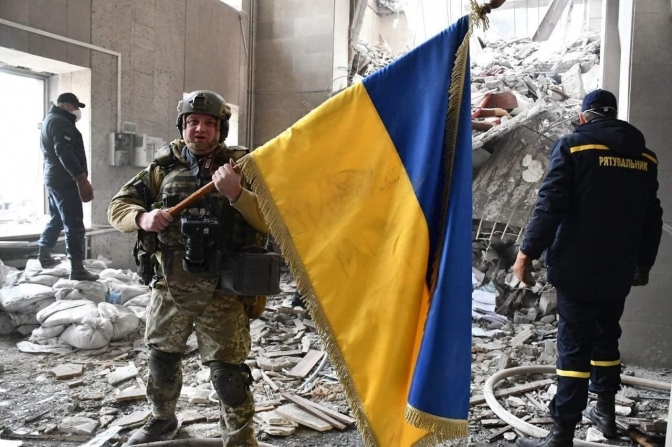
Another aspect that can be helpful is spending time with people you trust. We used to come together to share the burden of acute stress. Now it will be important doing joint activities to help us recover and act. This could be, for example, the cooperation of several families to go shopping in the supermarket. I know exactly such cases in Lviv on the example of residents of individual houses and entrances. These activities during this period will be very significant, important.
Another option is to allow yourself to learn to accept losses. While we are in an acute period, we to some extent forbid ourselves to think about what we have lost: a person, social status, house, support. And little by little, each of these losses makes us grieve individually. But we may not see it as grief. It’s important to at least start talking to someone we trust about what we’ve lost. Let go thoughts of who we have lost, honouring them, expressing gratitude. Think about what it taught us.
Colleagues said that, hiding from the bombs, they realized that most of the things they took with them to the shelter for a week, they absolutely do not need. That most valuable things you can put in one backpack. This is the moment when we pay attention to values and allow ourselves to let something go. Many people say that it was difficult to say goodbye to something. Now, we have the opportunity to learn to say goodbye to certain things or people with no less respect.
Can you tell us more about how to deal with the loss of loved ones, since part of Ukraine is experiencing a real genocide?
In the psychology of loss, we should consider the concept of «grief». Grief is our reaction to the realization that a loss has occurred. This is our crying, longing, change of appetite, sleep, behavior. These reactions may be similar. We see that most people experience grief in the same way. Grief is a process of recovery after loss or acceptance, formation of a new image, acceptance of oneself in new relationships without a person who meant a lot to us. This process is individual.
There are many aspects where each person’s experience will be different from the others. Maybe that’s why I’m not a fan of popular stage theories of grief through a series of denials, anger, bargaining or attempts to negotiate, depression and acceptance. All these processes occur as if intertwined. At certain moments, we may object, be angry, and be depressed. At some point, we may feel at ease and think that we can act differently, and then it may return to us again.
In fact, we first learn to accept the fact that a loved one is not around. When we lose a loved one, the emptiness is formed inside us and we feel it. It is often replaced by thoughts, memories, anxieties about lost relationships, the meaning we had for that person. Thus, it is not sincere desires for love that settle in this wasteland, but «anxious dissatisfied neighbours» who argue among themselves for the right to rule in our heads.
By clinging to the magical way of reincarnating this person, we do not allow ourselves to build new relationships. We do not allow the time allotted to us for this recovery to go at its own pace, in its own direction. This is a nonlinear process, it is wavy. At some point, we will feel overwhelmed by a great nostalgia for a person who is no more living. At some point, we may not mention a person and start blaming ourselves for it. At some point, we may realize that we are not able to get these thoughts out of our heads. And all this is absolutely normal. Through our memory of the lost person, we are trying to develop this new experience. It is definitely not worth denying, running away from her.
However, if you fixate on it, live with it, create certain life rituals, it will lead to stagnation. I know people who do not clean the room of a lost person, leave a place for her at the table… On the one hand, it is a tribute, but people deprive themselves of their own opinions. This is an element of closure in the wasteland, non-recognition of death as a fact. The traumatic experience will simply break through, destroying us and our ability to recover.
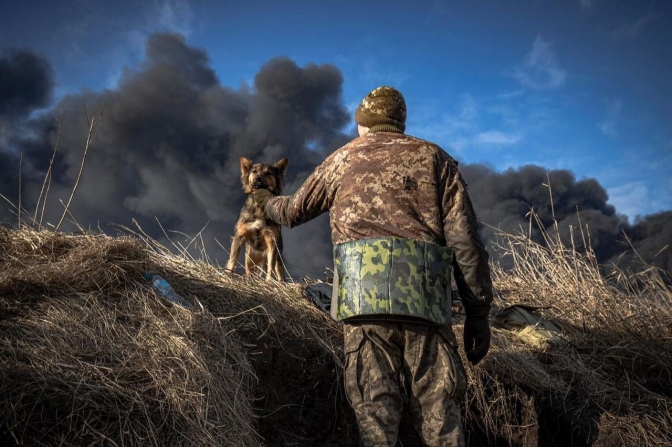
But if we maintain relationships with other people, mentally address the person who left, with gratitude, it will be much easier for us. Even if we have been in a difficult relationship with a person who is no more with us, we at least have something to thank him or her for. Or, conversely, to express their resentment, anger and thus have the opportunity to say goodbye. In psychology there is such a technique – «walk to the grave.» Rather, it is a way to let a person go, perform this «burial ritual» with gratitude and honour, and allow yourself to move on. Allow love to be present in our lives.
In fact, this is the main recommendations. We learn, each in his own way, to accept death as a fact, no matter how painful it may sound. We also allow ourselves to love without feeling guilty for this love, for new relationships, for the fact that we can be happy, we can have fun, and become better because of it.
How to talk to children about the war and how it will affect them? How to raise a healthy generation and adapt it to the post-war reality?
First of all, you should not underestimate children in the context of the information they can perceive and how much they can withstand it. There is an opinion that it is not necessary to talk about this with children and keep them as far away as possible from the war. But the further we keep them from the fact that war is now present in our lives, the worse. Needless to say, everything is ok, we just went to visit our relatives and don’t come back, because it’s better here. Children see our anxiety that goes beyond «going on vacation» or «moving somewhere.»
They have access to social networks and, believe me, have a wider imagination, they can imagine what they don’t know. Parents, guardians, people they trust need to explain in an accessible way for the child’s age what is really going on, what war is. Children already know about it. They read tales of a bad king who hid a princess, put a dragon as a guard, but someone will come to free her. Let there be such a metaphor, but child understands it. War is not a picture in a blockbuster, where there are heroes who come and save humanity from everything. Each of us is a hero who helps save Ukraine. So is the child. It can be a good component for a child’s own resource. Because by helping parents, child will show that he / she is doing well.
It is not right to say, when we lose a person in the war, that he or she «left and will return soon». You need to announce person’s death and pray for him / her together. Children are ready to accept everything if you are ready to communicate with them sincerely. You should not tell them about political aspects or intimidate them by insults such as «if you eat badly, sleep – Russians will come and take you with them.» This image will definitely remain, and children will pass it on to future generations.
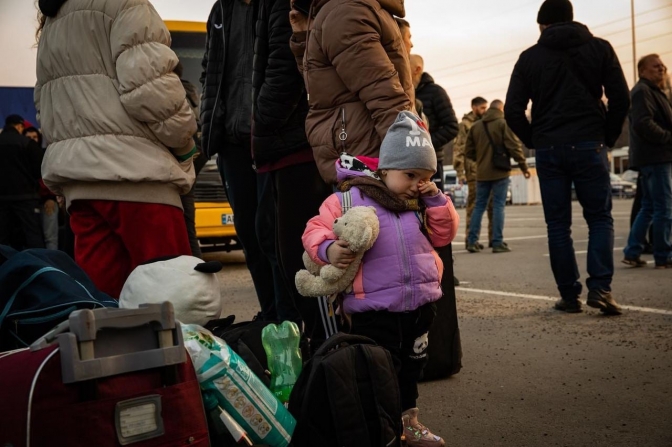
There must be examples that they can see here and now. The same volunteers who help civilians and the military. You can offer to child to help them move a small package. In this way, the child will realize that he or she can also be useful in difficult life circumstances. The element of realizing one’s small usefulness for a great cause is part not only of adapting to wartime, but also of a good foundation, which we will then «transfer» to rebuild our country.
If we can cooperate now, show that together we can be stronger, that each of us is Ukrainian and that we together form our identity in common cause, ideas, songs, culture, we will pass it on to children, and they will pass it on to future generations. It is thanks to them that we will build Ukraine we want to see in our current slogans.
Of course, the trauma will remain in their souls and will be transmitted, as well as the trauma of the Holodomor. This experience will be with us. The question is whether it will be our main driver. A person who has experienced a panic attack often forms the image of «never allow a panic attack.» Accordingly, there is the constant anxiety of not controlling something, and the panic attack comes again.
We need a healthy experience. Yes, it’s difficult, it’s awful, but we can handle it, because we already have good examples of how we deal with it now, at the level of each person, community, country in general. We may be disappointed in something, but it does not close all the doors. We can also gain experience from this without making anyone guilty, but look at it in perspective with a hypothetical possibility of returning to it.
Intuitively, we do. When we received the first refusal from NATO, we began to cooperate, and we came up with new ideas about negotiations, agreements, alliances. The same with people’s opinions. It was normal to be offended, to be angry, we had to somehow «evacuate» our energy. But then we came to the point that no matter how much we shouted or take offense, it could only get worse. We need to move on. Try to open the door by trial and error.
Roman Tyshchenko-Lamanskyi, translated by Kateryna Bortniak
Photo from the page of Volodymyr Zelenskyi
Follow us on Facebook. Lviv Now is an English-language website for Lviv, Ukraine’s «tech-friendly cultural hub.» It is produced by Tvoe Misto («Your City») media-hub, which also hosts regular problem-solving public forums to benefit the city and its people.



